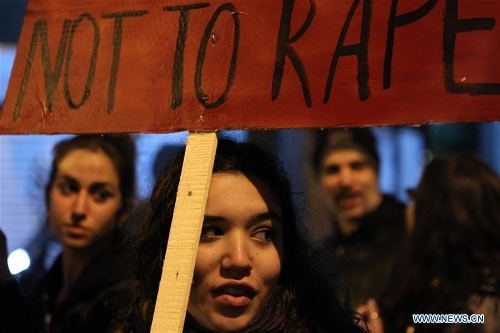WEF report expects workplace gender inequality to persist until 2276
Gender workplace equality 257 years away: WEF
Women may have to wait more than two centuries for equality at work, according to a report on Tuesday showing gender inequality growing in workplaces worldwide despite increasing demands for equal treatment.

The organization, which gathers the global elite in the plush Swiss ski resort of Davos each year, said that the worldwide gender gap in the workplace had widened further since last year, when parity appeared to be only 202 years off.
The Geneva-based organization's annual report tracks disparities between the sexes in 153 countries across four areas: education, health, economic opportunity and political empowerment.
The overall gender gap across these categories has shrunk, Tuesday's report showed, with WEF now forecasting it will take 99.5 years for women to achieve parity on average, down from the 108 years forecast in last year's report.
But while some sectors have shown improvements, others lag far behind.
General parity "will take more than a lifetime to achieve," WEF acknowledged in a statement.
WEF said the gender gap was more than 96 percent closed in the area of education and could be eliminated altogether within just 12 years.
The gap was equally small in the health and survival category, but the WEF report said it remained unclear how long it would take to achieve full parity in this domain.
Politics meanwhile is the domain where the least progress has been made to date, but it showed the biggest improvement in the past year.
Women in 2019 held 25.2 percent of parliamentary lower-house seats and 22.1 percent of ministerial positions, compared to 24.1 percent and 19 percent in 2018.
But when it comes to the workplace, the picture is less rosy.
The report, which looked at a variety of factors including opportunity and pay, said it would take 257 years before there was equality in the workplace.
It highlighted positive developments, like a general increase in the share of women among skilled workers and senior officials.
But it stressed that this trend was counterbalanced by "stagnating or reversing gaps in labor market participation and monetary rewards."
On average, only 55 percent of adult women are in the labor market today, compared to 78 percent for men, while women globally on average still make 40 percent less than men for similar work in similar positions.

Greek women demonstrate in central Athens, capital of Greece, on March 8, 2017. Greece marked International Women's Day on Wednesday with a series of events nationwide aimed to raise awareness of gender inequality. (Xinhua/Marios Lolos)
While women appear to be gradually closing the gender gap in areas such as politics, health and education, workplace inequality is not expected to be erased until the year 2276, according to a report published by the World Economic Forum (WEF).The organization, which gathers the global elite in the plush Swiss ski resort of Davos each year, said that the worldwide gender gap in the workplace had widened further since last year, when parity appeared to be only 202 years off.
The Geneva-based organization's annual report tracks disparities between the sexes in 153 countries across four areas: education, health, economic opportunity and political empowerment.
The overall gender gap across these categories has shrunk, Tuesday's report showed, with WEF now forecasting it will take 99.5 years for women to achieve parity on average, down from the 108 years forecast in last year's report.
But while some sectors have shown improvements, others lag far behind.
General parity "will take more than a lifetime to achieve," WEF acknowledged in a statement.
WEF said the gender gap was more than 96 percent closed in the area of education and could be eliminated altogether within just 12 years.
The gap was equally small in the health and survival category, but the WEF report said it remained unclear how long it would take to achieve full parity in this domain.
Politics meanwhile is the domain where the least progress has been made to date, but it showed the biggest improvement in the past year.
Women in 2019 held 25.2 percent of parliamentary lower-house seats and 22.1 percent of ministerial positions, compared to 24.1 percent and 19 percent in 2018.
But when it comes to the workplace, the picture is less rosy.
The report, which looked at a variety of factors including opportunity and pay, said it would take 257 years before there was equality in the workplace.
It highlighted positive developments, like a general increase in the share of women among skilled workers and senior officials.
But it stressed that this trend was counterbalanced by "stagnating or reversing gaps in labor market participation and monetary rewards."
On average, only 55 percent of adult women are in the labor market today, compared to 78 percent for men, while women globally on average still make 40 percent less than men for similar work in similar positions.
